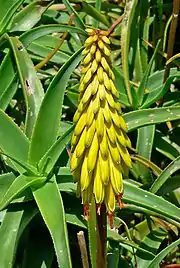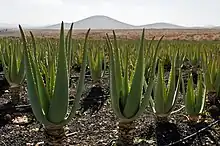aloe
English

Aloe striatula, an aloe (2)
Etymology
From Old English alwe (“fragrant resin of an East Indian tree”), from Latin aloē, from Ancient Greek ἀλόη (alóē), from Hebrew אָהָל (ʾāhāl), ultimately from Tamil அகில் (akil);[1] reinforced in Middle English by Old French aloes.
Pronunciation
- (General American) IPA(key): /ˈæ.loʊ/
- (Received Pronunciation) IPA(key): /əˈləʊ.i/, /ˈæ.ləʊ/
Audio (US) (file) - Rhymes: -æləʊ
Noun
aloe (plural aloes)
- (in the plural) The resins of the tree Aquilaria malaccensis (syn. Aquilaria agallocha), known for their fragrant aroma, produced after infection by the fungus Phialophora parasitica.
- A plant of the genus Aloe.
- 1912, Arthur Conan Doyle, The Lost World […], London; New York, N.Y.: Hodder and Stoughton, →OCLC:
- In mercy I put a bullet through his skull, and he fell sprawling among the aloes.
-
- A strong, bitter drink made from the juice of such plants, used as a purgative.
Usage notes
- Often used in plural (originally under influence of Old French aloes).
Derived terms
Translations
plant of the genus Aloe
|
References
- Shulman, David (2016) Tamil: A biography, Harvard University Press, pages 19-20:
- We have ahalim [in Hebrew], probably derived directly from Tamil akil rather than from Sanskrit aguru, itself a loan from the Tamil (Numbers 24.8; Proverbs 7.17; Song of Songs 4.14; Psalms 45.9--the latter two instances with the feminine plural form ahalot. Akil is, we think, native to South India, and it is thus not surprising that the word was borrowed by cultures that imported this plant.
Further reading
 aloe on Wikipedia.Wikipedia
aloe on Wikipedia.Wikipedia  Aloe on Wikispecies.Wikispecies
Aloe on Wikispecies.Wikispecies  Aloe on Wikimedia Commons.Wikimedia Commons
Aloe on Wikimedia Commons.Wikimedia Commons
Anagrams
Italian
Pronunciation
- IPA(key): /ˈa.lo.e/
- Rhymes: -aloe
- Hyphenation: à‧lo‧e
Further reading
- aloe in Treccani.it – Vocabolario Treccani on line, Istituto dell'Enciclopedia Italiana
Etymology 2
Borrowed from Ancient Greek (τὰ) Ἁλῶα ((tà) Halôa), derived from ἅλως (hálōs, “threshing floor”).
Pronunciation
- IPA(key): /aˈlɔ.e/
- Rhymes: -ɔe
- Hyphenation: a‧lò‧e
Noun
aloe f pl (plural only)
- (historical, Ancient Greece) a festival dedicated to Demeter, celebrated in the time of the harvesting of grapes
Further reading
- alòe in Treccani.it – Vocabolario Treccani on line, Istituto dell'Enciclopedia Italiana
Anagrams
Latin
Etymology
From Ancient Greek ἀλόη (alóē, “aloes”). Ultimately from Tamil அகில் (akil);[1]
Pronunciation
- (Classical) IPA(key): /ˈa.lo.eː/, [ˈäɫ̪oeː]
- (Ecclesiastical) IPA(key): /ˈa.lo.e/, [ˈäːloe]
Noun
aloē f (genitive aloēs); first declension
Declension
First-declension noun (Greek-type).
| Case | Singular | Plural |
|---|---|---|
| Nominative | aloē | aloae |
| Genitive | aloēs | aloārum |
| Dative | aloae | aloīs |
| Accusative | aloēn | aloās |
| Ablative | aloē | aloīs |
| Vocative | aloē | aloae |
Descendants
- → Catalan: àloe
- → Dutch: aloë
- → German: Aloe
- → Hungarian: aloé
- → Italian: aloe
- → Japanese: 蘆薈 (rokai)
- → Okinawan: 蘆薈 (rugwai, dugwai)
- → Old English: alwe
- → Old French: aloes
- → Old Irish: aloe
- → Portuguese: aloe
- → Russian: алоэ (aloe)
- → Scottish Gaelic: àloe
- → Serbo-Croatian: aloja / алоја
- → Swedish: aloe
- → Finnish: aaloe
- → Ukrainian: алое (aloe)
- → Translingual: Aloe, Aloë
References
- “aloe”, in Charlton T. Lewis and Charles Short (1879) A Latin Dictionary, Oxford: Clarendon Press
- “aloe”, in Charlton T. Lewis (1891) An Elementary Latin Dictionary, New York: Harper & Brothers
- aloe in Charles du Fresne du Cange’s Glossarium Mediæ et Infimæ Latinitatis (augmented edition with additions by D. P. Carpenterius, Adelungius and others, edited by Léopold Favre, 1883–1887)
- Shulman, David (2016) Tamil: A biography, Harvard University Press, pages 19-20:
- We have ahalim [in Hebrew], probably derived directly from Tamil akil rather than from Sanskrit aguru, itself a loan from the Tamil (Numbers 24.8; Proverbs 7.17; Song of Songs 4.14; Psalms 45.9--the latter two instances with the feminine plural form ahalot. Akil is, we think, native to South India, and it is thus not surprising that the word was borrowed by cultures that imported this plant.
Middle French
Etymology
From Old French aloe.
References
- Godefroy, Frédéric, Dictionnaire de l'ancienne langue française et de tous ses dialectes du IXe au XVe siècle (1881) (aloe)
Old French
Descendants
- Middle French: aloe
References
- Godefroy, Frédéric, Dictionnaire de l'ancienne langue française et de tous ses dialectes du IXe au XVe siècle (1881) (aloe)
Portuguese
Romanian
Declension
Declension of aloe
| singular | plural | |||
|---|---|---|---|---|
| indefinite articulation | definite articulation | indefinite articulation | definite articulation | |
| nominative/accusative | (o) aloe | aloea | (niște) aloe | aloele |
| genitive/dative | (unei) aloe | aloei | (unor) aloe | aloelor |
| vocative | aloe, aloeo | aloelor | ||
Spanish
Further reading
- “aloe”, in Diccionario de la lengua española, Vigésima tercera edición, Real Academia Española, 2014
This article is issued from Wiktionary. The text is licensed under Creative Commons - Attribution - Sharealike. Additional terms may apply for the media files.
